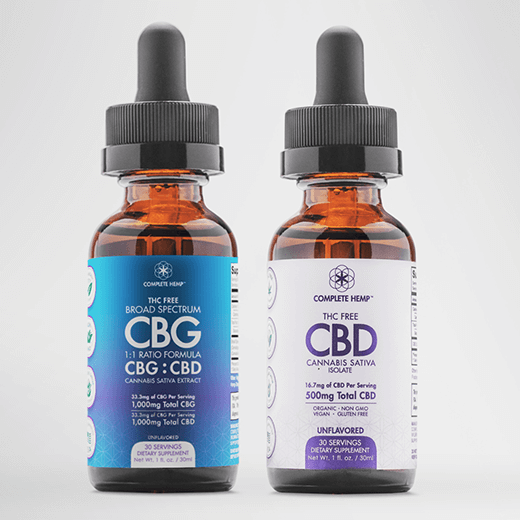Will CBG Replace CBD?
Jul 31st 2020
By now, you may already know that CBD oil and CBD products have been getting all the rave. In fact, you may already be using CBD for pain or for your skincare. What comes to a bit of surprise though is the latest name that sounds so similar to CBD. It’s no other than CBG!
Cannabigerol or CBG is another interesting non-psychoactive cannabinoid derived from the cannabis plant. Its properties have been garnering attention from health professionals and consumers alike. Some even say it might be replacing CBD.
So, is there any truth to this? Or does it even come close to CBD at all? Let’s find out!
What are Cannabinoids?
To better understand CBG and CBD, we must first talk about cannabinoids. Cannabinoids are naturally occurring compounds found in the Cannabis sativa plant. The term refers to substances that interact with cannabinoid receptors in the human body.
There are two main cannabinoid receptors in the body, CB1 and CB2. CB1 is more associated with the nervous system while CB2 is more associated with inflammation. Cannabinoids and their receptors are part of our own body's systems of helping regulate a variety of normal functions including mood, pain, appetite, and inflammation. This system is called the endocannabinoid system (ECS).
Cannabidiol (CBD) is another well known important component, which makes up about 40% of the plant resin extract. And now, making a statement is cannabigerol (CBG), which is present at low levels or usually less than 1% in most cannabis strains. CBG is considered as a minor cannabinoid.
The Difference Between CBD and CBG
CBD and CBG are both non-psychoactive cannabinoids. That means that using either will not result to any “high”.
As mentioned, most cannabis genetics only contain trace amounts of CBG, about 1%. Whereas, today, there are hemp strains that contain 20% CBD in the crop.
The main difference between CBD and CBG is that they come from different compounds within the cannabis plant and may also serve separate purposes. They are chemically different due to their different physicochemical properties and interactions with the endocannabinoid system (ECS).
CBD is known to have a relatively low affinity for cannabinoid receptors and acts mostly through indirect interactions with the endocannabinoid system. While CBG is thought to elicit directly through interaction with the CB1 and CB2 cannabinoid receptors in the brain.
Moreover, the psychoactive cannabinoid THC also produces its psychoactive effects though interactions with these receptors. On the other hand, CBG has been observed to work as a buffer to THC’s psychoactivity.
CBG, Mother of Cannabinoids
Discovered in the 1960s, CBG is the precursor from which all other cannabinoids are synthesized, which is why it has earned its title as the “Mother of All Cannabinoids”.
CBGA is the precursor to the acidic forms of tetrahydrocannabinol (THC), the main psychoactive ingredient in cannabis, and cannabidiol (CBD) called THCA and CBDA. With heat and time, THCA and CBDA get converted to THC and CBD. Both the acid and non-acidic or neutral cannabinoids have effects on the body. CBG is the non-acidic form of CBGA, and similarly gets converted with time and heat.
The Intricate Process of CBG
Since CBG is usually present at low levels in most cannabis strains, its minute percentage makes it more delicate to produce.
To create small amounts of CBG isolate, thousands of pounds of biomass are needed. So if the CBG content of the same crop is only 1%, you need to extract 20 times the amount of biomass to get the same amount of CBG out.
When it comes to producing CBG, you either give up your entire crop to process and produce pure CBG prior to the conversion into other cannabinoids or wait until it’s time to harvest the hemp plant, which may mean that there’s very little left to extract.
Which is the Right Choice?
Why choose when you can have both? This is not to say that you should go about hoarding CBD and CBG products altogether. It just means that you don’t have to skip on one just to use the other. Unlike CBD which has already a lot of successful studies under its belt, CBG is yet to be explored more. There have been studies about its potential therapeutic effects, and it is your responsibility, as a consumer, to know more about it. The best way to decide is to understand the functions of both CBD and CBG to determine which one your body needs more and which one better fits your lifestyle.

